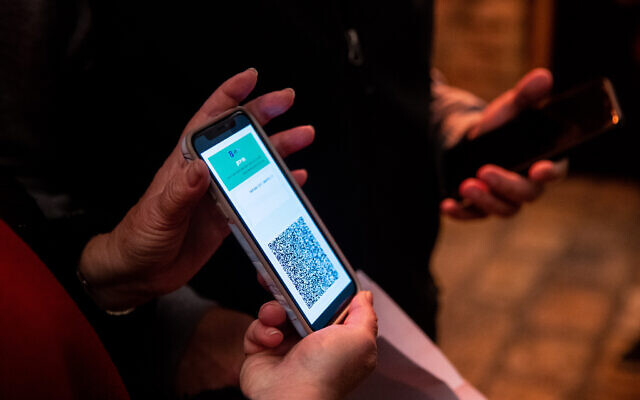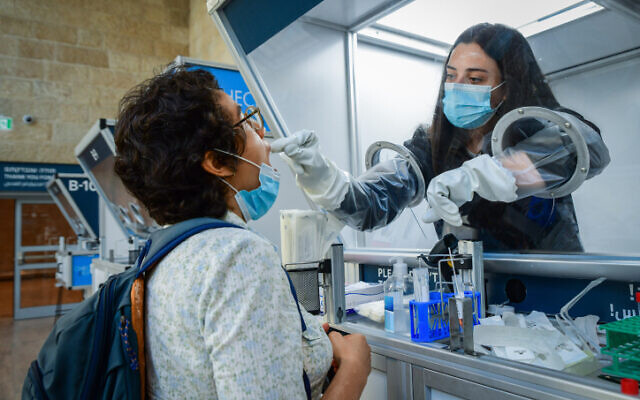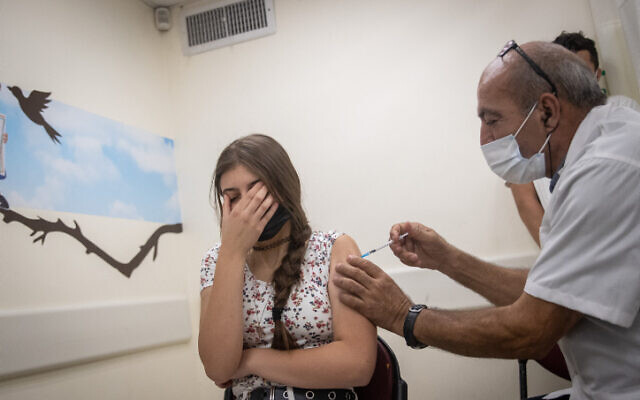Health officials reportedly considering return of ‘Green Pass’ system; Interior Minister Shaked warns incoming, outgoing flights could be halted; hospitalization rates remain low

The Health Ministry expects daily coronavirus diagnoses, currently standing at around 300, to jump to 500-600 next week amid the spread of the ultra-contagious Delta variant, according to multiple media reports Wednesday.
According to Haaretz, officials are considering bringing back the “Green Pass” system that differentiates between vaccinated and non-vaccinated citizens in access to certain venues and activities.
The plan, which was lifted on June 1, allowed only those vaccinated to dine indoors at restaurants and attend most cultural events.
According to the daily, health officials are also considering bringing back the “Purple Badge” system which sets certain requirements on businesses to allow them to operate.
Israel in recent days has seen daily caseload levels climb to levels not seen since April. Nearly 300 cases were confirmed on Tuesday and another 224 were reported by Wednesday evening. The hospitalization rate has remained low, however, with only 26 people hospitalized in serious condition on Wednesday.
The Delta variant of the virus, first identified in India, is more contagious than other variants and may be better able to bypass vaccines, but is believed to not cause serious infection among the vaccinated. The variant is believed to be around 40% more contagious than the original strain, according to the United Kingdom’s public health agency. The effectiveness of two vaccine doses for protection from hospitalization is at 96%, according to the agency.

Interior Minister Ayelet Shaked said Wednesday that flights in and out of Israel could be halted once again if the rate of new COVID cases continues to rise.
“The situation at Ben Gurion Airport is the central concern,” Shaked told reporters at Israel’s main airport after touring the terminal. “The simple solution is to close the airport. But the situation today is different than it was, and we’re trying to keep the airport open. But if morbidity rises, the flights will stop.”
Her comments came after Channel 12 news reported that the Health Ministry’s announced plan to separate those arriving from “banned” countries from other travelers at the airport was already facing trouble.

According to the network, a flight from Moscow, which is at Israel’s highest COVID travel warning level and to which Israelis are banned from flying, was slated to arrive Wednesday evening at Terminal 1, after being diverted there from the larger Terminal 3 in order to avoid those arriving from coming into contact with other travelers.
But two flights from Eilat to Tel Aviv were also slated to arrive at Terminal 1 at the same time. The TV report noted that there was nothing preventing those travelers from Russia from boarding the train at the airport with other travelers.
With case numbers rising, Israel has thus far reimposed an indoor mask mandate and cracked down on travelers arriving from countries with high infection rates or breaking quarantine, but has sought to avoid a return to the restrictions it largely emerged from over the last two months.
Prime Minister Naftali Bennett appealed to young teens on Sunday to vaccinate in order to avert restrictions, and declared: “We do not want to impose any limits — not on parties, or on trips or on anything.”
Since authorities launched a renewed drive to vaccinate teens aged 12- to 15-years old last week, the number of shots distributed daily has climbed back over 10,000 for the first time since early April. That’s when Israel’s world-leading vaccination drive stalled after distributing the vaccine to nearly 5 million people — the majority of its eligible population at the time.

On Monday, over 14,314 people received the first dose of the vaccine, up from 13,513 people who received the first dose a day earlier, according to Health Ministry data. Over 11,000 first doses were distributed by noon Tuesday.
And as of Tuesday morning, nearly 32 percent of Israelis in the 10-19 age bracket had received at least one dose of the vaccine, up from around 23% a week earlier, Health Ministry data showed.
Israel has a reported 1.4 million doses set to expire at the end of next month and Bennett is hoping to use as many of them as possible by getting 300,000 children vaccinated by July 9, leaving enough time for a second dose from another batch set to expire.
According to a Channel 12 report Wednesday night, to prevent vaccines from being tossed, Israel is in advanced talks with the UK to give it millions of Pfizer vaccines within days, in return for the European country supplying it with one of its future shipments from Pfizer at a later date.
Israel purchased millions of vaccines from Pfizer and was among the first countries to receive them, for an undisclosed amount. Despite having millions of unused doses, it inked a deal in April under former prime minister Benjamin Netanyahu for 18 million more doses, in case they are needed for booster shots.
As reported by The Times of Israel
